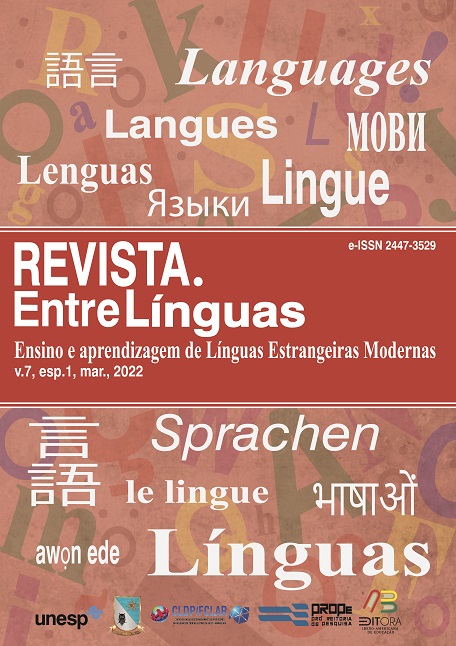Story reading impact on EFL learners' language development and comprehension
DOI:
https://doi.org/10.29051/el.v8iesp.1.16916Keywords:
Story Reading, Scaffolding interaction, Classroom participationAbstract
While there are numerous studies of educating EFL learners in the literature, story reading has gotten little study attention. However, just a few research studies have looked into story reading and its potential impact on EFL learners' language development. The impact of English Story Reading instruction on EFL learners' performance was investigated in this study. According to the findings, story Reading training increases student engagement, facilitates EFL reading and story-recall compositions. On the other hand, we are dealing with Storytelling, not just for pleasure. This study aims to diagnose the impacts of Storytelling on students' linguistic components of communication abilities and assess the extent to which Storytelling may assist students in improving their communication skills. The results demonstrate that Storytelling improves reading abilities by allowing kids to correlate meanings and emotions with words. Students expand their vocabulary and learn when and how to utilize specific words and phrases.
Downloads
References
AHMED, A. A. A.; GANAPATHY, A. Creation of Automated Content with Embedded Artificial Intelligence: A Study on Learning Management System for Educational Entrepreneurship. Academy of Entrepreneurship Journal, v. 27, no. 3, p. 1-10, 2021. Disponível em: https://www.abacademies.org/articles/creation-of-automated-content-with-embedded-artificial-intelligence-a-study-on-learning-management-system-for-educational-entrepre-11233.html. Acesso em: 10 fev. 2021.
ANWAR, S. ESL/EFL learners’ poor performance in English: The factors. Journal of Asian and African social science and humanities, v. 3, n. 1, p. 18-26, 2017. Disponível em: https://www.researchgate.net/publication/326588544_eslefl_learners'_poor_performance_in_english_the_factors. Acesso em: 10 jan. 2021.
CHEN, C. N. et al. The Effects of Extensive Reading via E-Books on Tertiary Level EFL Students' Reading Attitude, Reading Comprehension, and Vocabulary. Turkish Online Journal of Educational Technology, v. 12, n. 2, p. 303-312, 2013. Disponível em: https://eric.ed.gov/?id=EJ1015469. Acesso em: 04 mar. 2021.
GHORY, S.; GHAFORY, H. The impact of modern technology in the teaching and learning process. International Journal of Innovative Research and Scientific Studies, v. 4, n. 3, p. 168–173, 2021. Disponível em: https://ijirss.com/index.php/ijirss/article/view/73. Acesso em: 10 abr. 2021.
LARSARI, V. N. An investigation into Teacher Assessment Literacy (TAL) of Learners Writing Developments: Impact on learners writing achievements and Implications for Teacher Development. Journal of Social Sciences and Humanities Research, v. 9, n. 01, p. 93-100, 2021. Disponível em: https://journals.researchub.org/index.php/jsshr/article/view/1190. Acesso em: 10 abr. 2021.
LOTFI, S. A. T. et al. A Corpus-based Comparative Evaluation of Internationally Published vs. Locally Designed EFL Textbooks Regarding Politeness Strategy Teaching: Interchange vs. Prospect. Journal of Social Sciences and Humanities Research, v. 8, n. 3, p. 1-6, 2020. Disponível em: https://journals.researchub.org/index.php/JSSHR/article/view/900. Acesso em: 19 maio 2021.
MOHAMMADI, M.; POUYA, N. D. The Relationship between EFL Learners’ Mental Toughness and Critical Thinking. Journal of Social Sciences and Humanities Research, v. 9, n. 02, p. 25-36, 2021. Disponível em: https://journals.researchub.org/index.php/jsshr/article/view/1245. Acesso em: 02 maio 2021.
SUK, N. The effects of extensive reading on reading comprehension, reading rate, and vocabulary acquisition. Reading research quarterly, v. 52, n. 1, p. 73-89, 2017. Disponível em: https://ila.onlinelibrary.wiley.com/doi/10.1002/rrq.152. Acesso em: 14 abr. 2021.
TANG, S. et al. The Humor Story in Teaching Reading Comprehension. Journal of advanced english studies, v. 2, n. 2, p. 77-87, 2019. Disponível em: http://sastra.unifa.ac.id/journal/index.php/jes/article/view/65. Acesso em: 16 jun. 2021.
WAJNRYB, R. Stories: Narratives activities in the language classroom. Cambridge: Cambridge University Press, 2003.
Published
How to Cite
Issue
Section
License

This work is licensed under a Creative Commons Attribution-NonCommercial-ShareAlike 4.0 International License.
Os manuscritos aceitos e publicados são de propriedade da Revista EntreLínguas. Os artigos publicados e as referências citadas na Revista EntreLínguas são de inteira responsabilidade de seus autores.
Transferência de direitos autorais – autorização para publicação
Caso o artigo submetido seja aprovado para publicação, já fica acordado que o(s) autor(es) autoriza(m) a UNESP a reproduzi-lo e publicá-lo na EntreLínguas, entendendo-se os termos “reprodução” e “publicação” conforme definição respectivamente dos incisos VI e I do artigo 5° da Lei 9610/98. O artigo poderá ser acessado pela rede mundial de computadores (Internet), sendo permitidas, a título gratuito, a consulta e a reprodução de exemplar do artigo para uso próprio de quem a consulta, desde que haja a citação ao texto consultado. Essa autorização de publicação 328 EntreLínguas, Araraquara, v. 1, n .2, p. 323-328, jul./dez. 2015 não tem limitação de tempo, ficando a UNESP responsável pela manutenção da identificação do(s) autor(es) do artigo. Os artigos publicados e as referências citadas na Revista EntreLínguas são de inteira responsabilidade de seus autores.











